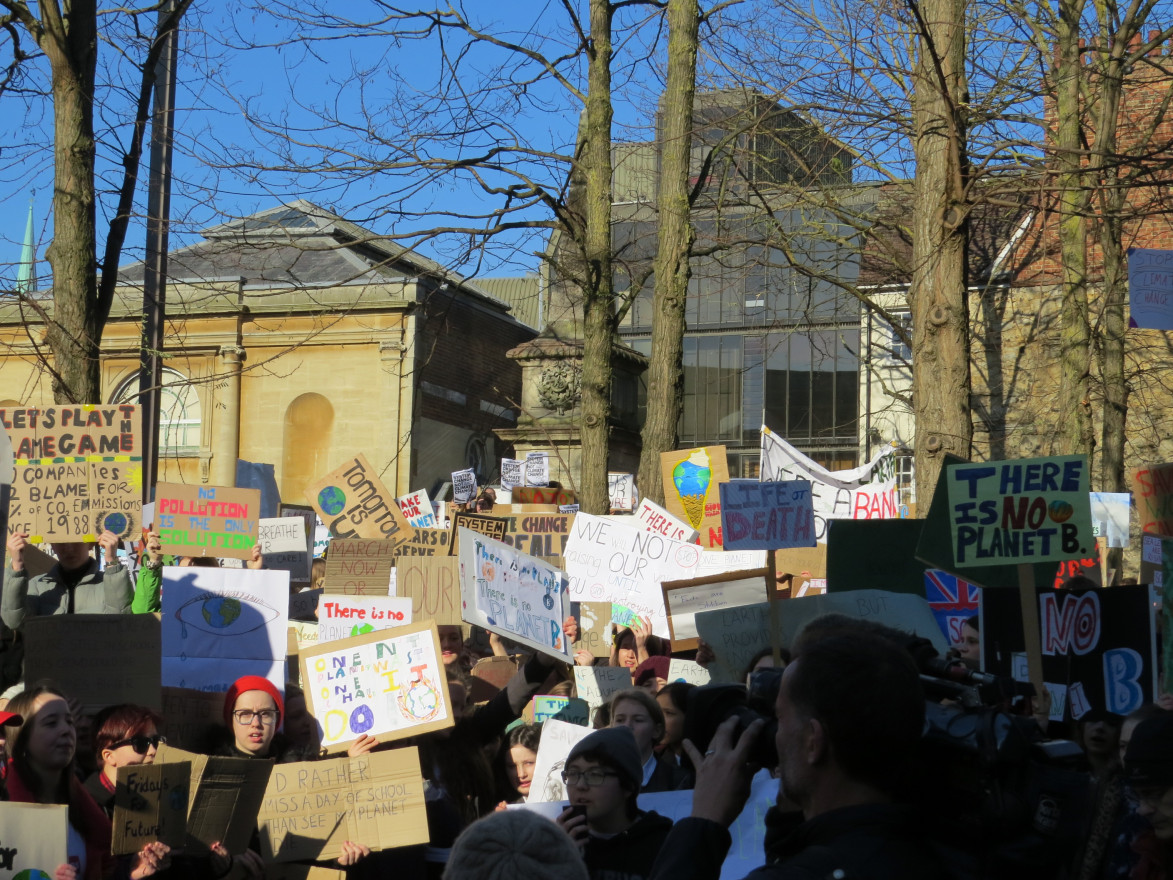
Students in Oxford, UK protesting against climate change injustice at as part of a nationwide youth climate strike (Evan Barnard/University of Georgia)

Students in Oxford, UK protesting against climate change injustice at as part of a nationwide youth climate strike (Evan Barnard/University of Georgia)
While studying abroad at the University of Oxford in Oxford, England, during the early months of 2019, I had the great opportunity to see what can happen when young people get together for a public demonstration of environmental mentality.
It was an unseasonably warm and sunny Friday, Feb. 15 – good weather for youth climate strikes across the United Kingdom. Before the main gathering strengthened in Bonn Square, the main site of Oxford’s strike, a banner for the youth climate strike was unfurled off of the Bridge of Sighs, one of Oxford’s most iconic landmarks.
By the time I arrived in the late morning, the plaza was filled with protestors of all ages, mostly school children who were skipping school to participate in the demonstration but also University of Oxford students, parents, and more elderly community members.
Most protestors held pickets and posters with handwritten slogans following the theme of the protest movement that the older generations have left the younger generation with a climate crisis they must fix. The subject matter of the signs overall covered an impressively broad range of climate change topics, including, “Our planet is not like your actions, it’s not rubbish”; “Stop climate changing before it changes the world”; “If the Earth were a bank, it’d be bailed out”; and “There is no Planet B.” There was also “No pollution is the only solution”; “I’d rather miss a day of school than see my planet die”; and even “Harry Potter and the Deadly Climate Change” (it was Oxford, after all).
The protesters’ emphasis on clever and often humorous signs contributed to the overall upbeat (or positive) atmosphere of the event.
The size of the constantly growing crowd was so great that people repeated different chants at opposite ends of the plaza. One of the more popular ones was the call and response chant of “What do we want? Climate action! When do we want it? Now!”
After striking in Bonn Square for a while, the majority of the protestors left and made a procession through Oxford City Centre and back around to Bonn Square, a trip they repeated several times over the course of the day. In addition to the convening and march, the event organizer brought in a number of speakers, including an environmental journalist and a student who did spoken word poetry. The strike as a whole was executed as a very peaceful and minimally disruptive protest without any outside intervention.
I was curious about the environmental interests of the participants, so I posed a few questions of Martin Parker, a student from Leeds, U.K., studying math in St. Catherine’s College at the University of Oxford. When I asked him why he attended the strike, Martin said, “I find it inspiring watching the youth strikes….and seeing it on the news. I think it’s a very exciting movement. I’m inspired by the global aspect as well. I think it’s really motivating that people are getting together across the country and across the world.”
Although the interview was challenging because the crowds’ chanting was deafening, I asked Martin how long he has been interested in environmentalism.
“All my life I’ve been aware and conscious of the issues facing the planet. I’ve never been involved in activism until recently,” he said. “I think it’s the same case for a lot of people, that they’ve seen movements like this coming up a lot recently and are just getting involved now.”
As a Planet Forward Correspondent and student of environmental journalism, I was interested in what the participants of the strike thought about the importance of sharing climate stories through public communication. Surveying the scene, I spotted a woman wearing a name badge, which upon closer inspection was a card which read “Ask me anything, I’m a climate researcher.” She was Dr. Michelle Cain, a science and policy research associate at the University of Oxford Environmental Change Institute. I asked her about what impact she thinks environmental storytelling has on people’s understanding and interest in the current climate situation.
“I think storytelling is very powerful and everyone can…engage with a good story,” she responded. “There are only so many articles you can read, but the ones that really grab you are the ones that are telling a good story.” Covering climate events and people’s personal perspectives and experiences can encourage increased focus on and participation in global efforts to facilitate change.
Today’s young people will need to contend with the implications of climate change exponentially more so than older generations, and I am proud to have witnessed youth standing in such unity for justice against what will be the greatest challenge during their lifetimes.